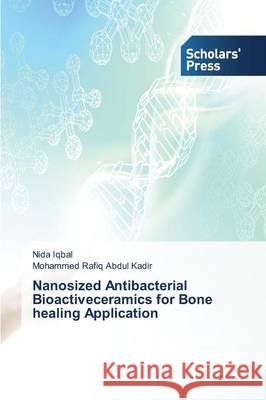Nanosized Antibacterial Bioactiveceramics for Bone healing Application » książka
Nanosized Antibacterial Bioactiveceramics for Bone healing Application
ISBN-13: 9783639859492 / Angielski / Miękka / 2015 / 104 str.
Bioceramics are one of the most important class of biomaterials which have been recognized as bone replacement materials due to their excellent bioactivity, biocompatibility and osteoconductivity properties. However; it exhibits poor antibacterial activities, long-term in vivo performance of bioceramics can be affected by the presence of various bacterial infections resulting in debilitating pain and often results in removal of implants. In view of the aforementioned conditions, antibacterial bioactive ceramics have developed. The introduction of metal ions into bioceramics has two advantages. Firstly, incorporating metal ions such as (Ag, Zn, F etc.) can improve the properties such as solubility, crystallinity and morphology properties. Secondly can provide excellent antibacterial and bioactivity properties. Therefore, simultaneous additions of ions have the potential to decrease the healing time due to faster osseointegration and low chance of bacterial infection. Thus resulting bioceramics is expected to have superior properties than hydroxyapatite (HA), and hence will be more promising as a biomaterial for implantation and use in human than pure H
Bioceramics are one of the most important class of biomaterials which have been recognized as bone replacement materials due to their excellent bioactivity, biocompatibility and osteoconductivity properties. However; it exhibits poor antibacterial activities, long-term in vivo performance of bioceramics can be affected by the presence of various bacterial infections resulting in debilitating pain and often results in removal of implants. In view of the aforementioned conditions, antibacterial bioactive ceramics have developed. The introduction of metal ions into bioceramics has two advantages. Firstly, incorporating metal ions such as (Ag,Zn,F etc.) can improve the properties such as solubility, crystallinity and morphology properties. Secondly can provide excellent antibacterial and bioactivity properties. Therefore, simultaneous additions of ions have the potential to decrease the healing time due to faster osseointegration and low chance of bacterial infection. Thus resulting bioceramics is expected to have superior properties than hydroxyapatite (HA), and hence will be more promising as a biomaterial for implantation and use in human than pure HA.











